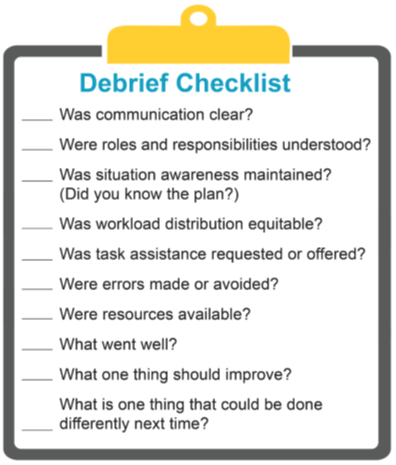Reviewing the Team's Performance: Debrief
Research has shown that teams that effectively debrief their own performance can improve their teamwork in real time.1,2,3,4 Although it is often difficult to find time for such reviews in healthcare, TeamSTEPPS advocates for after-action reviews; TeamSTEPPS change agents try to include opportunities to debrief after critical team events. These events are excellent learning opportunities for team members and can help sustain the implementation of TeamSTEPPS.
Debriefs include:
- Accurate recounting and documentation of key events.
- Analysis of why the event occurred, what worked, and what did not work.
- Discussion of lessons learned and how the team can alter the plan for future cases.
- Reinforcement of what went well and how the team can repeat the behavior or plan better for future cases.
- Establishment of a method to formally change the existing plan to incorporate lessons learned.
Debriefs are most effective when conducted in an environment where mistakes are viewed as learning opportunities. Debriefs can be a short (about 3 minutes or less) team event, typically initiated and facilitated by the team leader. Debriefs are most useful when they relate to specific team goals or address particular issues related to recent team actions. Debriefs should focus on performance improvement. It is important to reinforce what went well and avoid assigning blame or failure to any individual regarding what did not go well.
Debrief Checklist
The Debrief Checklist shown below can help organize debriefs to ensure they are efficient and address key issues.

Two guidelines for conducting debriefs are:
- Facilitate the discussion as a leader by asking questions related to team performance. For example: What did we do well? What did not go well that we can improve?
- Recap the situation, background, and key events. As with the brief, the team leader should cover the items on this (or a similar) debrief checklist. The team can use the checklist during a debrief to ensure that all information is discussed. The team leader should then summarize lessons learned and set goals for improvement.
Notes
- Reyes DL, Tannenbaum S, Salas E. Team development: the power of debriefing. People Strat J 2018;41(2):46-51.
- Ryan S, Ward M, Vaughan D, Murray B, Zena M, O'Connor T, Nugent L, Patton D. Do safety briefings improve patient safety in the acute hospital setting? A systematic review. J Adv Nurs 2019 Oct;75(10):2085-2098. Accessed April 26, 2023.
- Chin TL, Cash J, Blacker H, Thomas M, Bernal NP, Burton K, Joe VC. 456. Timely debriefing facilitates real-time communication and feedback, improves team performance, and provides data clarity for quality improvement. J Burn Care Res 2019 Mar 9;40(Supplement_1):S201. DOI: 10.1093/jbcr/irz013.351. Accessed April 26, 2023.
- Gilmartin S, Martin L, Kenny S, Callanan I, Salter N. Promoting hot debriefing in an emergency department. BMJ Open Qual 2020 Aug 1;9(3):e000913. Accessed April 26, 2023.



